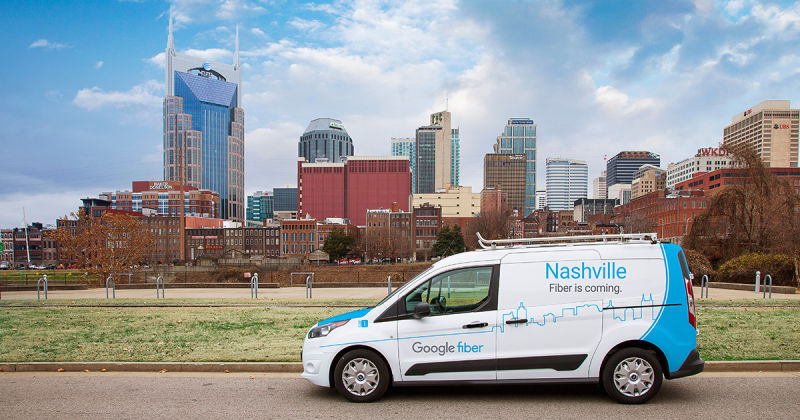Google Fiber division cuts staff by 9%, “pauses” fiber plans in 10 cities | Ars Technica

The Alphabet division that operates Google Fiber is laying off or reassigning about nine percent of its staff as well as "pausing" or ending fiber operations in 10 cities where it hadn't yet fully committed to building.
Google Fiber chief Craig Barratt will step down from his post and remain only as an adviser. He won't be replaced immediately. This is not the end of Google Fiber, however: the Alphabet-owned ISP already offers fiber Internet service in eight metro areas and is still committed to building in another four. Google Fiber also recently purchased a wireless ISP called Webpass, which offers high-speed wireless Internet in six metro areas and seems set on expanding wireless service going forward.
Barratt revealed most of the news in a blog post that Google Fiber published with the title "Advancing our amazing bet." The post doesn't specify the number of layoffs, but a source familiar with the company's plans confirmed that nine percent of the Alphabet "Access" division that operates Google Fiber will have their roles eliminated, though some of these people could be moved to other parts of Alphabet. The source did not say exactly how many employees that percentage represents. Access includes more than just Google Fiber, so the percentage of Google Fiber employees being laid off or reassigned is probably a little higher.
In August, a report by The Information claimed that Alphabet CEO Larry Page ordered Barratt to halve the size of the Google Fiber team to 500 people. Google Fiber never confirmed or denied that report, but it now seems the layoffs may not be as extensive as initially reported.
Alphabet headcounts are hard to come by, but this Bloomberg report says Access has about 1,500 employees. The Information report indicates that Google Fiber had about 1,000 employees before the layoffs. If both of those numbers are accurate, then the percentage of Google Fiber employees being laid off or reassigned to other parts of Alphabet might be around 13.5 percent.
Google Fiber apparently has not hit its subscriber goals, and fiber construction is a costly endeavor. While the company isn't giving up on fiber entirely, it may be able to deploy Internet service at a lower cost using wireless technology.
Barratt wrote:
These changes to our business and technology will have some immediate implications. Some of our efforts will remain unchanged, but others will be impacted. In terms of our existing footprint, in the cities where we've launched or are under construction, our work will continue. For most of our 'potential Fiber cities'—those where we've been in exploratory discussions—we're going to pause our operations and offices while we refine our approaches... In this handful of cities that are still in an exploratory stage, and in certain related areas of our supporting operations, we’ll be reducing our employee base.
Here are the details on where Google Fiber will and won't be deploying Internet service. Google Fiber is already available in:
- Atlanta, Georgia
- Austin, Texas
- Charlotte, North Carolina
- Kansas City in Missouri and Kansas
- Nashville, Tennessee
- Provo, Utah
- Salt Lake City, Utah
- The Triangle in North Carolina
Google Fiber has committed to building in Huntsville, Alabama; Irvine, California; San Antonio, Texas; and Louisville, Kentucky. Those plans are unchanged, the company says.
The 10 areas that Google Fiber listed as "potential" Fiber cities are subject to the "pause." That's where employees will lose their jobs. The cities where Google Fiber operations will be paused or ended are:
- Chicago, Illinois
- Dallas, Texas
- Jacksonville, Florida
- Los Angeles, California
- Oklahoma City, Oklahoma
- Phoenix, Arizona
- Portland, Oregon
- San Diego, California
- San Jose, California
- Tampa, Florida
Google Fiber just removed Chicago and San Diego from its list of potential fiber cities. However, both of those cities have Webpass wireless deployments, so they aren't totally out of luck.
AT&T and Charter have sued Louisville to stop a new ordinance that gives Google Fiber easier access to utility poles. Google Fiber told us that the lawsuit will not stop it from building in the city.
Separate from the fiber deployments, the Google Fiber-owned Webpass operates in Boston, Chicago, Miami, San Diego, Oakland, and San Francisco. Webpass provides fiber-like speeds, but with the downside of more limited deployment. The wireless technology is cost-effective for multi-unit residential buildings and businesses, but not in suburban single-family homes.
Some of the details about Google Fiber cities in this article were changed after publication to reflect updated information provided by the company. We've also added details about Alphabet and Google Fiber headcounts.